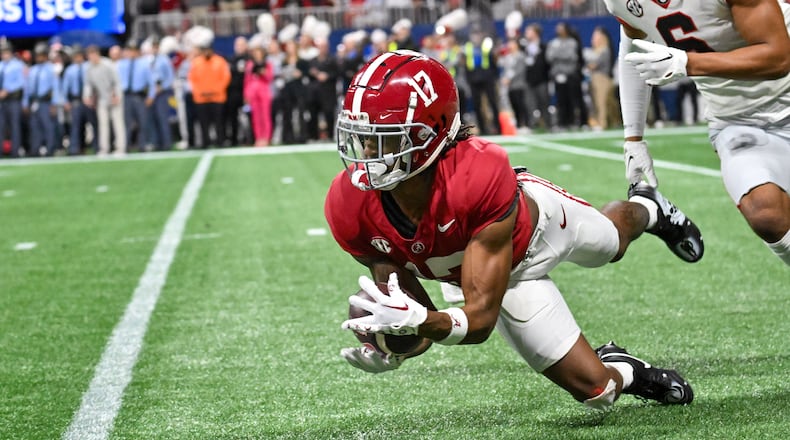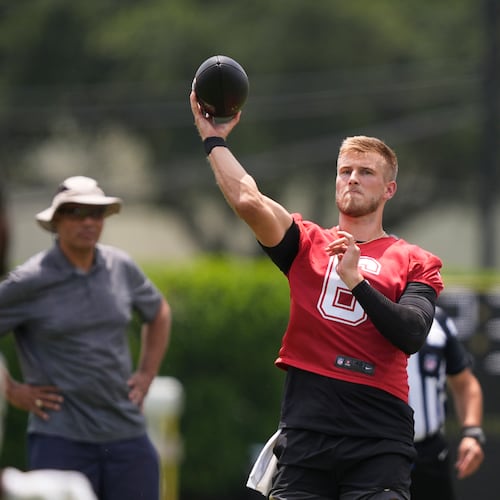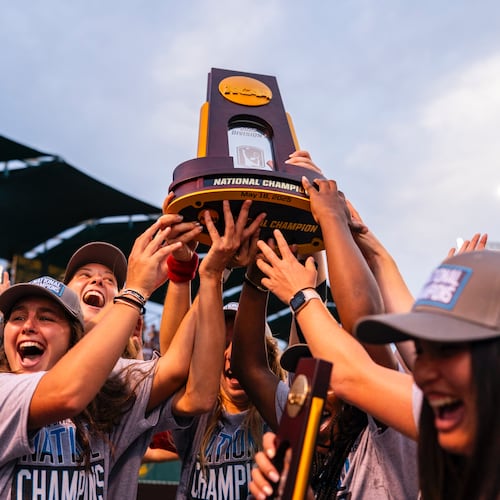ATHENS — It was a huge moment in the game, and CBS broadcasters went on-and-on about how SEC referees appeared to have gotten it wrong and the play in question should have been subject to a closer review.
Instead, a fourth-down catch by Alabama receiver Isaiah Bond stood, and the Crimson Tide went on to score a touchdown on the next play with only 48 seconds left in the first half. That would prove critical as Alabama held on for a 27-24 win over Georgia in the SEC Championship game Saturday at Mercedes-Benz Stadium.
The implications were huge. The Bulldogs’ CFP ranking dropped from No. 1 to No. 6 based on the result and Alabama, as the 2023 SEC champion, catapulted from No. 8 to No. 4, allowing it to be included in the College Football Playoff.
Asked this week why the fourth-and-4 play was not reviewed, the SEC insisted that it was reviewed. An SEC spokesman told The Atlanta Journal-Constitution, responding to an email requesting an explanation, that “every play is reviewed in the Video Center, but some are stopped for further review. The play you referenced was reviewed, and it was determined there was not enough evidence to overturn the call and not necessary to stop the play for further review.”
Georgia coach Kirby Smart, of course, could have stopped play and asked for further review. But after the game, he said he had no reason to think he should at the time, and he had to be mindful of his timeouts. The Bulldogs had only one timeout remaining after using their second at the 1:25 mark, after Alabama sent its offense on the field.
“The first staple of any review is they review it up top,” Smart said. “They go quick. For me to ask for a review, it costs me a timeout. They get to watch it. I was not aware of it being called or not called. I guess you’re saying the replay showed he didn’t catch it. That was an extremely critical play in the game because they go on to score there.”
Georgia burned its first timeout of the half on its third offensive possession of the game, in the first quarter when there was pre-snap alignment confusion facing third-and-2 at the Bulldogs’ 33-yard line. After the stoppage, they ran a toss sweep left, and Daijun Edwards was stopped for a 1-yard loss.
Watch: AJC video breaking down Georgia’s streak-snapping loss
There is no question how the CBS broadcasters calling the game felt about the play. As soon as he saw the first instant replay, CBS analyst Gary Danielson declared that officials had missed the call. Later, they brought in their resident correspondent referee, Gene Steratore, to review the play. The retired NFL official told Danielson and play-by-play announcer Brad Nessler he thought the SEC’s replay official monitoring the game should have buzzed in to stop play and take a closer look.
“Replay officials are no different than officials on the field,” Steratore explained. “In those situations, with the clock running and things moving so fast and the team coming up to snap the football, a replay official has to feel in real time that there is the potential that this may be something that it doesn’t appear to be.”
Danielson then asked Steratore if he thought the replay official should have stopped play to review the completion.
“That’s my opinion,” Steratore said.
Of course, none of that matters now. The final results are in the books. There always are missed calls and incorrect calls made in the course of every game.
On social media, Georgia fans expressed outrage about that call and pointed to several others they felt didn’t go their way:
- An interference call on Georgia safety Malaki Starks at the beginning of that fateful end-of-half drive by Alabama appeared to have been incorrect.
- Undoubtedly, the personal-foul, horse-collar penalty on Georgia linebacker Xavian Sorey was wrong. His hands clearly were on each shoulder pad. Ultimately, though, that Alabama possession did not result in points.
- Many felt Ladd McConkey was the victim of pass interference by Alabama defensive back Terrion Arnold on a second-down play late in the third quarter that would have resulted in a first down and extended the Bulldogs’ ninth possession of the game.
At this point, though, there’s nothing the Bulldogs can do but forget it and get ready for their matchup against Florida State in the Orange Bowl on Dec. 30 (4 p.m., ESPN). The Seminoles (13-0), by the way, have one or two things to complain about as well.
About the Author
Keep Reading
The Latest
Featured




